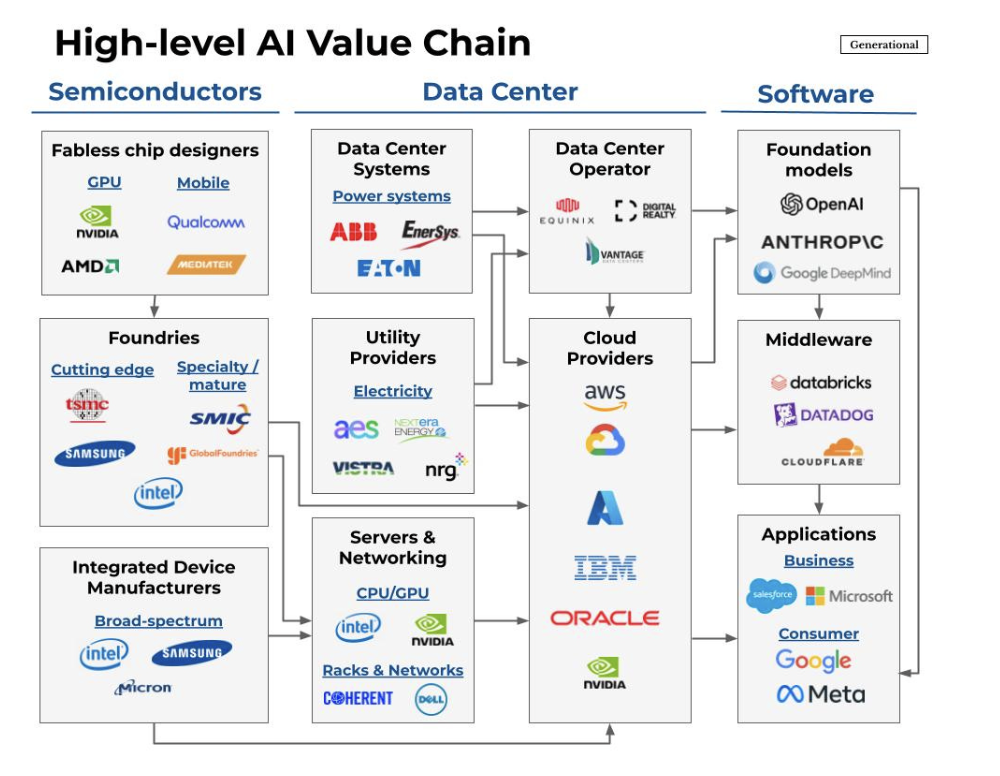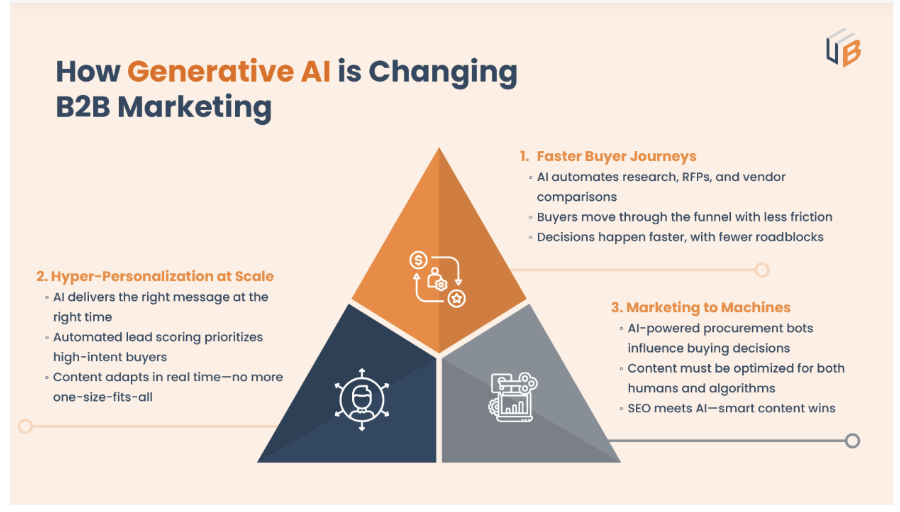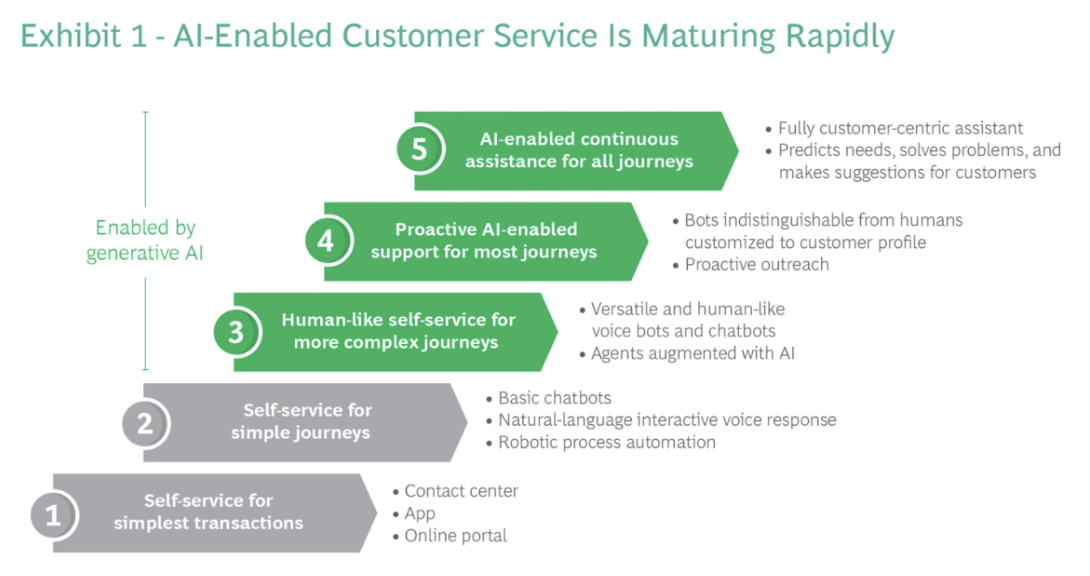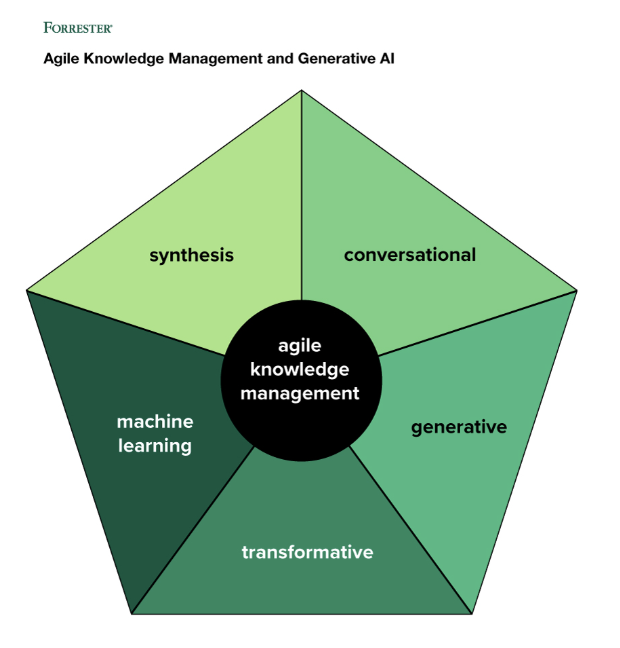As of October 2025, the B2B sector is undergoing a seismic shift driven by generative AI (GenAI). What began as experimental tools in 2023 has now become integral to business operations, with adoption rates soaring to over 42% in marketing and sales alone. Generative AI is not just automating tasks; it’s redefining how companies engage buyers, streamline support, and manage knowledge. In this blog, we’ll explore five transformative ways GenAI is reshaping the B2B landscape, complete with practical examples in marketing, customer support, and knowledge management. Keywords like “generative AI in B2B,” “AI trends 2025,” and “B2B digital transformation” highlight the urgency for businesses to adapt or risk falling behind in this AI-powered era.
The global GenAI market is projected to reach $107.5 billion by 2028, fueled by its ability to enhance productivity by 3-5% in sales and beyond. From hyper-personalized campaigns to proactive support agents, GenAI is enabling B2B firms to deliver value at scale. But success requires ethical implementation, quality data, and cross-functional alignment. Let’s dive into the details.

1. Hyper-Personalized Content at Scale
Generative AI is revolutionizing B2B marketing by enabling the creation of tailored content that resonates with individual buyers, slashing production times and boosting engagement metrics. In 2025, 85% of B2B marketers leverage GenAI for content ideation, transforming static materials into dynamic, intent-aligned assets. This shift addresses the growing demand for personalized experiences, where buyers expect content that speaks directly to their pain points and industry challenges.
In marketing, GenAI tools like Jasper and Copy.ai allow teams to generate high-quality copy, visuals, and videos in minutes, adapting language to specific sectors. For instance, a cybersecurity firm can use GenAI to scan threat reports and auto-create whitepapers on trending topics like “AI-Powered Phishing Attacks,” optimizing them for AI-driven searches.
Practical Examples in B2B Marketing:
- Lumen Technologies’ Campaign Acceleration: By integrating Adobe Gen Studio, Lumen reduced campaign launch times from 25 to 9 days. The tool generates personalized emails, ads, and landing pages based on buyer data, leading to a 30% increase in lead conversions through targeted LinkedIn efforts.
- Automated Social Media Posts: Companies like Citi use Vertex AI to fuel generative initiatives, automating targeted social content that boosts engagement by 25%. This includes creating industry-specific posts for platforms like X or LinkedIn, incorporating keywords such as “B2B AI marketing trends 2025.”
- Personalized Email Campaigns: GenAI drafts emails with stage-aware messaging, as seen in tools from Smith Digital, where AI adapts tone for prospects in awareness or decision stages, improving open rates by up to 40%.
This personalization extends to knowledge management, where GenAI synthesizes data into custom reports, ensuring content is not only relevant but also actionable.
2. Autonomous AI Agents in Sales and Support
AI agents are emerging as virtual “coworkers” in B2B, handling routine interactions with empathy and intelligence. Forrester forecasts that by 2025, 64% of B2B leaders will invest more in conversational automation, unlocking 3-5% productivity gains globally. These agents predict needs, resolve issues, and free human teams for strategic work, fundamentally altering customer support and sales dynamics.
In customer support, GenAI enables proactive care, auto-resolving up to 40% of tickets through natural-language processing. For example, Klarna’s B2B fintech adaptation saved $1.5 million in Q1 2024 by generating empathetic responses to complex queries like contract disputes.
Practical Examples in Customer Support:
- Proactive Issue Detection: A tech firm uses GenAI to analyze usage data and guide clients through API troubleshooting in real-time, reducing resolution times by 50%.
- AI Chatbots for 24/7 Assistance: Platforms like those from Mosaicx handle common questions instantly, with generative AI drafting personalized replies based on history. This is crucial for “generative AI customer service” in global B2B operations.
- Automated Ticket Routing: Tools from eDesk route tickets intelligently, using GenAI to categorize and prioritize based on urgency, boosting efficiency by 30%.
In knowledge management, GenAI aids RFP responses by sifting through documents to draft compliant bids, cutting prep time and increasing win rates by 25%. This integration exemplifies how AI agents bridge sales, support, and knowledge silos.
3. Generative Engine Optimization (GEO) for AI-Driven Discovery
Traditional SEO is evolving into GEO, where content is optimized for AI summaries rather than mere clicks. By late 2025, AI-generated traffic could account for 20% of B2B organic visits, growing 40% monthly as buyers turn to tools like ChatGPT for vendor insights. This requires structured, authoritative content with FAQs, data tables, and expert quotes to rank in generative searches.
In marketing, GEO ensures visibility in AI responses, driving early-funnel leads without heavy ad spend. Responsive’s TRACE Score framework evaluates AI outputs for accuracy, helping SaaS providers appear in buyer queries and increase leads by 15%.
Practical Examples in Marketing:
- AI-Ready Content Pages: B2B brands create pages with bold structures to feature in summaries, incorporating keywords like “AI in B2B buyer journey 2025.”
- Intent Scoring for Prospects: A startup used GenAI to filter 5,500 prospects to 55 high-potentials, generating leads in 35 hours while auditing for bias.
- Personalized Buyer Experiences: Folloze’s platform disrupts traditional journeys by using GenAI to rewrite content dynamically, enhancing discovery.
This trend ties into knowledge management, where GenAI optimizes internal search for faster access to insights, supporting GEO efforts.
4. Intelligent Knowledge Extraction and Sharing
GenAI is democratizing knowledge in B2B, turning vast data silos into actionable intelligence. With 89% of buyers using GenAI in their purchase process, “agile KM” is essential, automating capture and retrieval for informed decisions. Trends show 38% of KM teams using AI for content recommendations and 31% for new asset creation.
In knowledge management, tools like Shelf integrate with centers to suggest real-time answers from wikis, halving agent times and reigniting growth by 20% in industrials firms.
Practical Examples in Knowledge Management:
- Auto-Generated Briefing Packs: GenAI distills market reports into packs, enhancing sales pitches with up-to-date insights.
- Regulatory Tagging for Support: Hiperstream’s tool categorizes data flows, improving communication by 200% in financial services.
- Content Synthesis: IBM’s platforms collect and share data for organizational insights, using GenAI for transformative synthesis.
In customer support, this means turning documents into help articles, as seen in proactive dashboards tracking contact reasons.
5. Ethical, Cross-Functional AI Ecosystems
In 2025, GenAI’s impact peaks when integrated ethically across functions, addressing biases and privacy while driving 5-15% productivity gains. Cross-functional teams combine tech with domain knowledge, as predicted in top trends.
Practical Tips for Implementation:
- Data Foundation Building: Start with clean data to avoid biases, as advised in webinars.
- Pilot Use Cases: Test in marketing or support, measuring ROI before scaling.
- Human Oversight: Blend AI with empathy, ensuring ethical audits in ecosystems.
Forrester reports 76% satisfaction among early adopters, but ignoring ethics risks obsolescence.
In conclusion, generative AI is amplifying B2B roles, from marketing personalization to support automation and knowledge sharing. As we navigate 2025, embracing these changes with strategic keywords like “GenAI B2B trends” will be key to growth. Start small, align teams, and watch your business thrive in this AI-driven landscape.
SymuFolk: Shaping the Future of B2B with Generative AI
At SymuFolk, we help businesses unlock the full potential of Generative AI to drive smarter marketing, seamless automation, and data-driven decision-making. Our AI-powered platforms — from RevCast and CarbonIQ to CyberPulse SOC — enable B2B enterprises to personalize engagement, optimize operations, and scale innovation responsibly.
As the B2B landscape evolves, SymuFolk empowers organizations to adapt faster, operate smarter, and grow sustainably in an AI-driven world.
FAQs:
1. How is Generative AI changing the B2B landscape in 2025?
Generative AI is redefining how B2B companies engage clients — from hyper-personalized marketing to intelligent automation in sales and support. It’s helping businesses enhance productivity, reduce costs, and accelerate decision-making across departments.
2. What are the key benefits of using Generative AI in B2B marketing?
AI enables personalized campaigns, faster content creation, and better lead targeting. Tools like Jasper, Copy.ai, and SymuFolk’s own AI frameworks help businesses create tailored content that resonates with each buyer’s intent and industry.
3. How can B2B companies start implementing Generative AI?
Start small with focused pilot projects — such as automating email campaigns or knowledge synthesis — and ensure your data is clean and structured. Partnering with experts like SymuFolk can help you build scalable, ethical AI solutions aligned with business goals.
4. What is Generative Engine Optimization (GEO), and why is it important?
GEO is the evolution of SEO — optimizing content for AI-driven discovery. As tools like ChatGPT and Gemini shape search behavior, GEO helps brands stay visible in AI-generated summaries and queries, driving organic leads in 2025 and beyond.
5. How does SymuFolk help enterprises leverage Generative AI?
SymuFolk develops AI-powered solutions like RevCast, CarbonIQ, and CyberPulse SOC to help businesses harness data intelligence, automate operations, and enhance customer engagement — responsibly and at scale.









